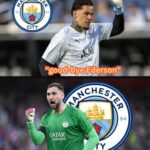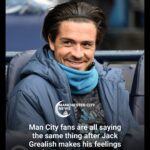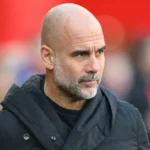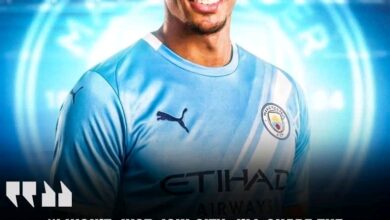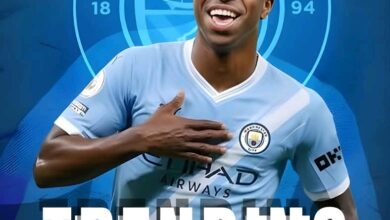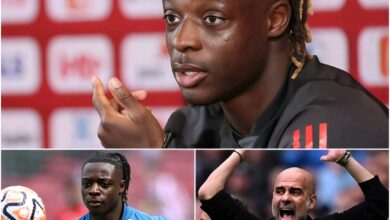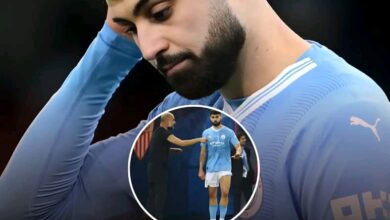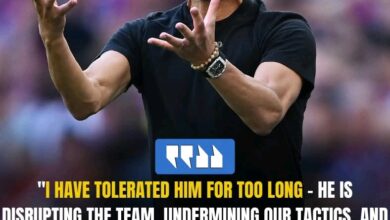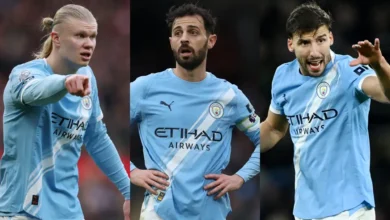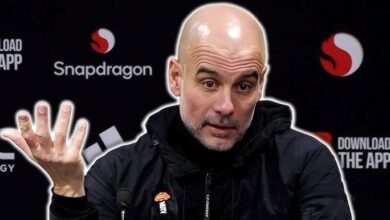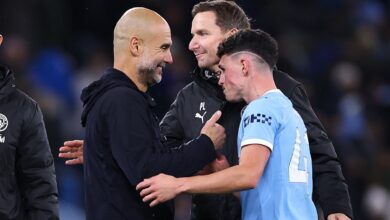Jack Grealish where are you?’ – Erling Haaland heartbroken with Man City set to break up bromance by selling £100m ace
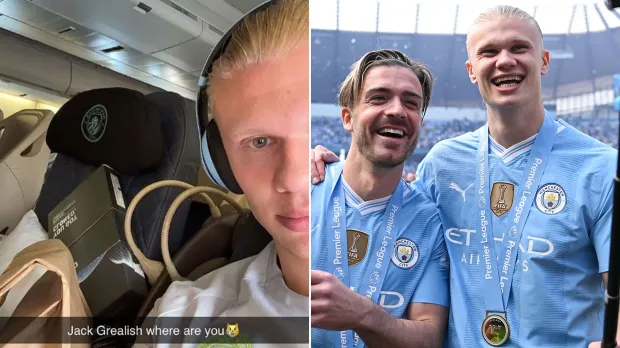
In the unforgiving world of elite football, where multi-million pound transfers and tactical reshuffles are as common as morning training sessions, human connections often become casualties of progress. This reality hit home with particular poignancy on June 13, 2025, as Manchester City’s squad departed for the Club World Cup in the United States, leaving behind one of their most recognizable faces and creating a social media moment that perfectly encapsulated the emotional cost of modern football’s ruthless efficiency.
The image was both simple and devastating: Erling Haaland, the Norwegian goal machine who has terrorized Premier League defenses since his arrival at the Etihad Stadium, sitting alone on a private jet, his usual companion’s seat occupied only by luggage. His Snapchat story, viewed by over 1.2 million followers, carried a message that resonated far beyond its simple words: “Jack Grealish where are you?” followed by a crying cat emoji that somehow managed to convey the genuine bewilderment and sadness of a friend suddenly finding himself alone.
The Unlikely Friendship That Captivated Football
To understand the significance of this moment, one must first appreciate the remarkable friendship that developed between two of football’s most contrasting personalities. When Erling Haaland arrived at Manchester City from Borussia Dortmund three years ago, few could have predicted the bromance that would blossom between the disciplined, machine-like Norwegian striker and Jack Grealish, the £100 million attacking midfielder whose reputation for enjoying life off the pitch was as well-established as his creativity on it.
Haaland, even at just 24 years old, had already established himself as perhaps the most professional athlete in world football. His dedication to his craft bordered on the obsessive – ten hours of treatment per day, ice baths, religiously maintained diet regimens, and a recovery routine that would make Olympic athletes envious. He approached football with the methodical precision of a scientist, viewing his body as a carefully calibrated instrument that required constant maintenance and optimization.
Grealish, by contrast, represented a more traditional approach to the modern footballer’s lifestyle. At 29, the Birmingham-born winger had never hidden his love for the social aspects of football culture. His celebrations were legendary, his nights out well-documented, and his approach to life refreshingly unfiltered in an era of sanitized social media personas. Yet despite these surface-level differences, or perhaps because of them, the two formed a bond that became one of the most endearing storylines of Manchester City’s recent success.
A Study in Contrasts
The beauty of their friendship lay precisely in its contradictions. Grealish himself had spoken about their relationship with characteristic honesty, revealing the genuine care that existed beneath their playful dynamic. “Everyone is different, aren’t they?” he had said in a previous interview, his words now carrying additional weight in light of recent events. “Look at Erling. He is the best professional I have ever seen. We have a great friendship but he will point at me after a game and say, ‘Hey, don’t you go out tonight partying’.”
This wasn’t the stern disapproval of a judgmental teammate, but rather the caring concern of a friend who understood both the demands of elite football and the importance of personal well-being. Haaland’s “mindset is something you won’t see again,” Grealish had continued, his admiration for his friend’s dedication evident. “He does everything. Recovers. In the gym. 10 hours of treatment a day. Ice baths. Diet.”
The relationship worked both ways, of course. While Haaland provided Grealish with an example of unwavering professional discipline, Grealish offered something equally valuable – a reminder that football, for all its pressures and expectations, remained fundamentally about joy, creativity, and human connection. Their friendship became a microcosm of football’s eternal tension between the personal and the professional, the individual and the collective, the heart and the head.
The Club World Cup Departure: A Moment of Truth
The departure for the Club World Cup should have been a moment of excitement for Manchester City. The tournament, featuring the world’s best club teams competing in the United States, represented another opportunity for Pep Guardiola’s side to add to their impressive trophy collection. Their first match against Moroccan side Wydad AC in Philadelphia would kick off what they hoped would be another successful campaign.
The traveling squad of 27 players included all four of City’s new summer signings, worth a combined £112 million, signaling the club’s commitment to the competition. These fresh faces represented the future, the next chapter in Manchester City’s evolution under Guardiola’s guidance. Yet for all the optimism surrounding these new additions, it was the absence that captured attention and highlighted the sometimes brutal realities of football’s modern landscape.
Jack Grealish, the £100 million man who had arrived at Manchester City amid such fanfare and expectation, was nowhere to be found among the traveling party. His omission wasn’t due to injury or personal circumstances – it was a calculated decision that spoke volumes about his standing at the club and his future prospects in sky blue.
The Business of Football: When Sentiment Meets Strategy
The decision to exclude Grealish from the Club World Cup squad was understood within football circles as something far more significant than a simple tactical choice. Sources close to the club suggested that the 29-year-old had been informed that his future lay elsewhere, and that his absence from such a high-profile tournament was designed to facilitate his departure from the Etihad Stadium.
This is the modern reality of elite football – a business where personal relationships, individual brilliance, and even significant financial investments can be sacrificed on the altar of tactical evolution and squad optimization. Grealish’s situation exemplifies the precarious nature of professional football careers, where a player can go from being a marquee signing to an “outcast” in the space of a few seasons.
The term “outcast” might seem harsh, but it reflects the binary nature of modern football decisions. In Guardiola’s system, players are either integral to the tactical plan or they become surplus to requirements. There is little middle ground, and sentimentality rarely influences decisions when trophies and millions of pounds are at stake.
The Social Media Response: Modern Football’s Emotional Landscape
Haaland’s social media post provided a fascinating glimpse into how modern footballers navigate the intersection of personal relationships and professional obligations. The image he shared – a selfie on the team’s private jet, showing an empty seat beside him with bags placed where his friend would normally sit – was simultaneously casual and profound.
The choice of platform was significant too. Snapchat, with its temporary, informal nature, felt like the appropriate medium for such a raw, unguarded moment. This wasn’t a carefully crafted Instagram post with professional photography and marketing consideration – it was a spontaneous expression of genuine feeling, shared with his 1.2 million followers in a moment of vulnerability.
The crying cat emoji, seemingly trivial, added a layer of both humor and pathos that perfectly captured the complexity of the situation. It acknowledged the absurdity of expressing genuine sadness through social media while simultaneously conveying real emotion. In an era where footballer social media posts are often sanitized and corporate-approved, Haaland’s message stood out for its authenticity.
Grealish’s Response: Finding Peace in Uncertainty
While Haaland was publicly lamenting his friend’s absence, Grealish himself was painting a very different picture of his current situation. His Instagram story provided the answer to Haaland’s question, but it also revealed a man who had found a way to embrace his changed circumstances with characteristic grace.
The images Grealish shared were striking in their serenity – his legs dangling over crystal-clear ocean water, the camera panning up to reveal a stunning seascape dotted with luxury yachts in a picturesque harbor. His caption was simple but loaded with meaning: “Peaceful,” followed by an emoji of a man receiving a massage.
This response revealed several layers of Grealish’s character and situation. On the surface, it showed a man making the best of his circumstances, finding beauty and tranquility away from the pressures and expectations of elite football. The luxury setting suggested that his exclusion from the Manchester City squad hadn’t affected his lifestyle – he remained financially secure and able to enjoy life’s finer pleasures.
More subtly, the post carried undertones of defiance and self-assurance. Rather than wallowing in disappointment or publicly expressing frustration with his club’s decision, Grealish was demonstrating that his identity and happiness weren’t entirely dependent on his football career. The image of peace and relaxation stood in stark contrast to the intensity and pressure of the Club World Cup campaign his teammates were embarking upon.
The Broader Implications: Football’s Changing Landscape
The Grealish-Haaland situation reflects several broader trends in modern football that extend far beyond these two individuals. The increasing professionalization of the sport has created an environment where tactical flexibility often trumps individual brilliance, and where even significant financial investments in players can be written off if they don’t fit the evolving tactical vision.
Grealish’s journey at Manchester City exemplifies this reality. When he arrived for £100 million, he was seen as one of the Premier League’s most creative and unpredictable attacking players. However, Guardiola’s system demands specific tactical discipline and positional awareness that sometimes conflicts with the kind of individual flair that made Grealish such an attractive prospect in the first place.
This tension between individual creativity and collective tactical discipline is one of the defining features of modern football. Players like Grealish, who built their reputations on unpredictability and moments of individual brilliance, often struggle to adapt to systems that prioritize structure and collective movement over personal expression.
The Human Cost of Tactical Evolution
What makes this story particularly poignant is how it illustrates the human cost of football’s relentless pursuit of tactical perfection. The friendship between Haaland and Grealish represents something genuine and valuable that exists beyond tactics, formations, and transfer values. Yet even such genuine human connections can become casualties when clubs make strategic decisions about their future direction.
Haaland’s social media post wasn’t just about missing a friend – it was about the sudden disruption of a relationship that had become an important part of his life in Manchester. The Norwegian striker, for all his professional dedication and goal-scoring prowess, is still a young man who values friendship and human connection. His public expression of loss highlighted how even the most successful athletes are affected by the personal consequences of professional decisions.
The Role of Social Media in Modern Football Narratives
The way this story unfolded across social media platforms also demonstrates how modern football narratives are shaped and shared. Both Haaland’s question and Grealish’s response reached millions of people instantly, creating a shared moment of understanding about the realities of professional football.
Social media has become the primary medium through which footballers communicate directly with fans, bypassing traditional media gatekeepers and club communications departments. This direct line of communication allows for moments of genuine spontaneity and emotion that wouldn’t be possible through more formal channels.
However, it also creates new pressures and expectations. Every post is scrutinized for meaning, every emoji analyzed for subtext. Footballers must navigate the balance between authentic self-expression and the potential consequences of sharing too much or saying the wrong thing.
Looking Forward: The Future of Both Players
As Manchester City embarks on their Club World Cup campaign without Grealish, questions remain about the future paths of both players. For Haaland, the tournament represents another opportunity to demonstrate his goal-scoring prowess on the global stage. His track record suggests he’ll adapt to his friend’s absence and continue his relentless pursuit of goals and trophies.
The striker’s public acknowledgment of missing Grealish also reveals a more human side to his personality that fans rarely see. Known primarily for his machine-like efficiency in front of goal, this moment of vulnerability shows that even elite athletes are affected by personal relationships and emotional connections.
For Grealish, the situation presents both challenges and opportunities. At 29, he’s at a crucial stage of his career where his next move could define his legacy. The peaceful images he shared suggest a man who has made peace with his situation and is ready for whatever comes next.
His exclusion from the Club World Cup squad, while disappointing, also represents an opportunity to find a new environment where his particular skills and approach to the game might be better appreciated. Football history is full of players who flourished after leaving clubs where they never quite fitted the system.
Conclusion: When Football Meets Life
The story of Haaland’s social media plea and Grealish’s serene response ultimately transcends football itself. It’s a story about friendship in the face of change, about finding peace amid uncertainty, and about the very human emotions that exist beneath the surface of professional sport.
In an era where football is increasingly dominated by data analytics, tactical systems, and financial considerations, moments like these remind us that the sport is still fundamentally about people. The relationships formed between teammates, the bonds created through shared experiences, and the emotions generated by success and disappointment are what make football compelling beyond the mere spectacle of athletic achievement.
Haaland’s question – “Jack Grealish where are you?” – will likely be remembered long after the specific circumstances that prompted it are forgotten. It captures something universal about friendship, loss, and the way that professional obligations can disrupt personal relationships.
Grealish’s response, meanwhile, suggests that sometimes the most powerful answer to life’s disruptions is to find peace within yourself, to embrace change with dignity, and to remember that there are many different ways to find fulfillment and happiness.
As both players move forward in their respective journeys, their friendship serves as a reminder that even in the high-stakes world of elite football, the most important victories are often the most personal ones – the relationships we build, the grace with which we handle adversity, and the peace we find in knowing who we are beyond our professional roles.
The Club World Cup will eventually end, transfer windows will close, and new tactical systems will emerge. But the image of Haaland sitting alone on that plane, genuinely missing his friend, and Grealish finding tranquility by the ocean will endure as a perfect snapshot of football’s eternal tension between the professional and the personal, between ambition and humanity, between what the game demands and what the heart needs.



